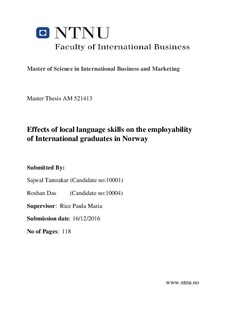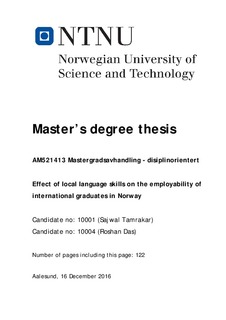| dc.contributor.advisor | Rice, Paula Maria | |
| dc.contributor.author | Tamrakar, Sajwal | |
| dc.contributor.author | Das, Roshan | |
| dc.date.accessioned | 2017-10-24T13:15:58Z | |
| dc.date.available | 2017-10-24T13:15:58Z | |
| dc.date.issued | 2016 | |
| dc.identifier.uri | http://hdl.handle.net/11250/2461878 | |
| dc.description.abstract | Many studies suggest that language is almost the essence of international business (Bondarouk, Ruel & Looise, 2011). This study focuses on the role of local language skills on the employability of international graduates in Norway. Norwegian being the local language in question. Many authors agree that employability of a graduate is based on certain employability skills which include communication skills, emotional intelligence and social capital. This study argues that language skills influence the communication skills, emotional intelligence and social networking skills of international graduates. | nb_NO |
| dc.description.abstract | Based on a qualitative study conducted with 11 participants, including 3 job-seekers, 5 skilled job workers and 3 employers from Norway and taking the key to employability model forwarded by Dacre Pool and Sewell (2007) as a base to study international graduate's employability, this study forwards an argument that Norwegian Language skills are influential in defining and measuring an international graduate's employability in Norway. This study extends the key to employability model to include a global perspective and argues that when the model includes a global perspective and evaluates an international graduate's employability, there are many additional factors that can affect a graduate's employability. This study considers local language skills to be one of such factors. | nb_NO |
| dc.description.abstract | Based on the model, the effect of language skills on the generic skills, emotional intelligence and social capital in turn affects the reflection and evaluation of international graduates' selfconfidence, self-esteem and self-efficacy, which goes on to affect their employability as a whole. This study also supports the view that language skills are influential only on certain kinds of fields and organization where language skills play a critical role in the job requirements. The types of fields have been categorized into two groups, social and technical. This study concludes that international graduates aiming for a career in the social field would require language skills more than one's aiming for technical fields. These findings have been supported from triangulation of two perspectives of employability; individual perspective and organizational perspective. Findings of the study also suggest that English language is influential in supporting the employability of international graduates and helping them overcome the language barrier in Norway. | nb_NO |
| dc.language.iso | eng | nb_NO |
| dc.rights | Attribution-NonCommercial-NoDerivatives 4.0 Internasjonal | * |
| dc.rights.uri | http://creativecommons.org/licenses/by-nc-nd/4.0/deed.no | * |
| dc.subject | Language | nb_NO |
| dc.subject | Employability | nb_NO |
| dc.subject | Communication skills | nb_NO |
| dc.title | Effects of local language skills on the employabiblity of International graduates in Norway. | nb_NO |
| dc.type | Master thesis | nb_NO |
| dc.subject.nsi | VDP::Social science: 200::Education: 280 | nb_NO |
| dc.subject.nsi | VDP::Social science: 200::Economics: 210::Business: 213 | nb_NO |
| dc.source.pagenumber | 118 | nb_NO |


